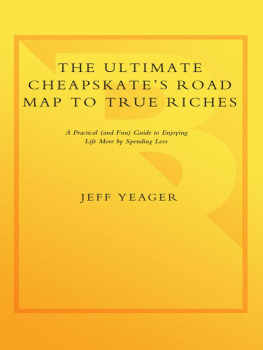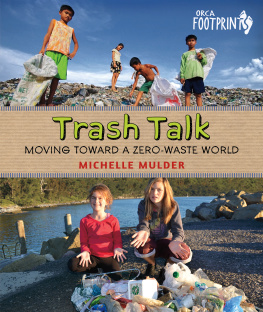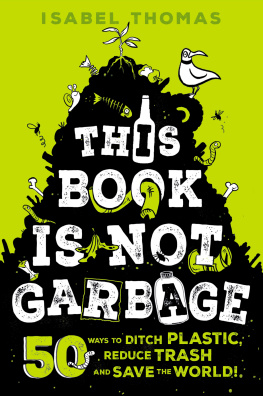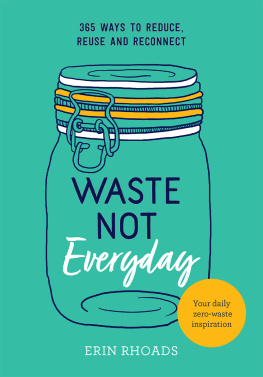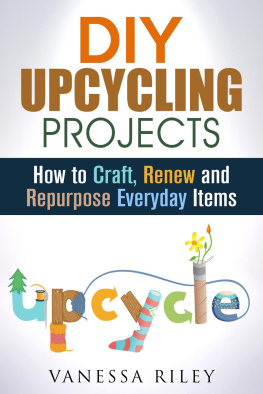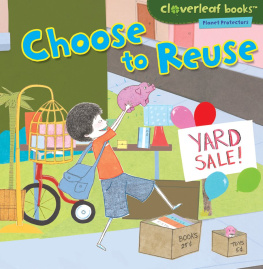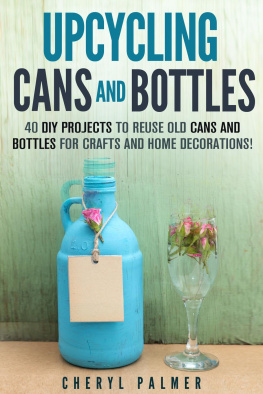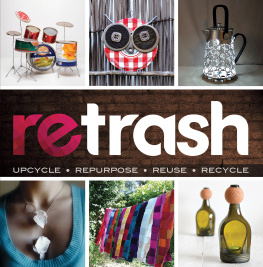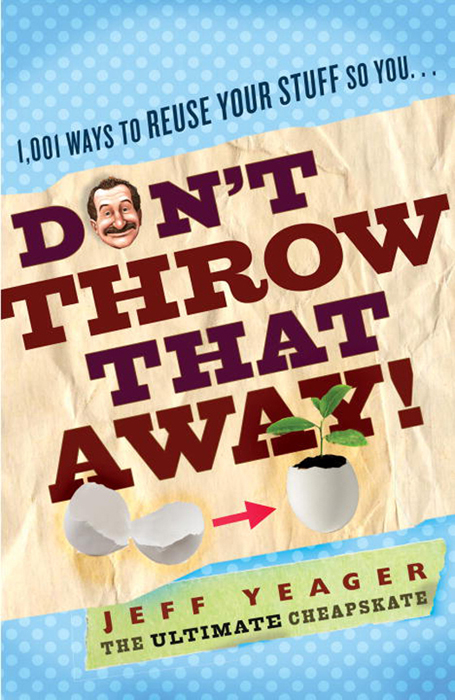Also by Jeff Yeager:
The Cheapskate Next Door
The Ultimate Cheapskates Road Map to True Riches
How to Retire the Cheapskate Way
1,001 Ways to Reuse Your Stuff So You
Dont Throw That Away
Jeff Yeager
Copyright 2012 by Jeffrey Yeager
All rights reserved.
eISBN: 978-0-9915167-6-6
Cover design: Kyle Kolker
Cover illustration: Scott Pollack
To my grandparents, Ellen and Clyde Yeager and Irma and Kenneth Tex Cooper, and to everyone who, like them, lived through the Great Depression.
The motto of that Greatest Generation was Use it up, wear it out, make it do, or do without. May we learn from that and always remember them.
CONTENTS
Chapter 1
ReduceReuse, Reuse, Reuse, and Reuse AgainThenRecycle
I dont know when repurposingfinding ways to reuse things that might otherwise be thrown awaybecame a word.
And depending on which dictionary you believe, it may still not be a real word. This, despite the fact that today you cant attend any gathering from a cocktail party to a PTA meeting without words like repurposing, renewable, sustainability, and recyclable cropping up in the conversation.
When you think about it, repurposingalso known as upcyclingshould have been one of the first words ever invented. After all, weve been doing it since Clovis Man realized that the tusk of the mammoth he just slayed would make a dandy weapon with which to bludgeon more mammoths. Or, depending on your historical and religious perspectives, ever since Adam and Eve discovered theres more than one use for the modest fig leaf. (FYI, theyre also great for wrapping fish in and then grilling.)
Heck, Im thinking that maybe even those big stone slabs at Stonehenge were actually leftover granite countertops from some Druids prehistoric kitchen remodeling project. Honey, go out in the yard and stand those twenty-ton stone fragments up on end. I think theyll look a lot better than the neighbors lawn jockeys carved out of mammoths tusks, dont you?
But its only been recentlythanks in part to the economic belt tightening prompted by the recession and the burgeoning green movementthat weve begun to rediscover something that those souls who lived through the Great Depressionand those who lived beforecame to know so well: There are all kinds of practical, money-saving ways to reuse stuff that our generation has come to simply throw away.
Thats what this book is about. Its entirely devoted to the second element of the old environmentalists mantra: Reduce, Reuse, Recycle.
In the pages ahead youll find hundreds of ways to repurpose all sorts of would-be throwaway items, from everyday practical tips to truly bizarre examples of ber repurposing. As the Ultimate Cheapskate, Ill be sharing some of my own favorite repurposing tips and tricks with you, as well as tons of others supplied by my Miser Advisers, a worldwide network of fellow frugal folks who volunteer as my bargain-basement brain trust. I can guarantee that youll save both a lot of money and the earths resources if you adopt even a fraction of the ideas offered in this book. And I promise youll have fun and be introduced to some colorful gurus-of-repurposing along the way. (Did that lady in Michigan really make a mural out of dryer lint, and then sell it for $12,000?)
As you can see from the table of contents, chapters in the book are devoted to general topics or themes (e.g., repurposing items in the bathroom, repurposing items for the holidays, etc.) as opposed to specific throwaway items. But the index at the back of the book is organized by individual items that can be repurposed. So, if youre wondering what you can do with that worn-out pair of pantyhose, that out-of-date phone book, or the milk that just went sour, consult the index to find references to those items in various chapters throughout the book.
But whatever you do, Dont Throw That Away!
Why Bother?
Everybody seems to have a notoriously frugal, rather eccentric, great-aunt Maggie. You know, the one who saves and reuses her Ziploc baggies until their zip is entirely zapped.
When you were a kid, she wrapped your birthday presents in the Sunday comic. The secondhand knapsack she gave you for high school graduationthe one you still use whenever you travelwas even more cleverly wrapped in a slightly outdated map of the world that the local library was going to throw away. And family legend has it that Great-Aunt Maggie has been using and reusing the same sheet of aluminum foil since the Johnson administration (were talking Andrew Johnson, not LBJ).
Maybe you even get an occasional chuckle about your great-aunt Maggie and her penny-pinching practices.
Having spent most of my life living what I call the cheapskate lifestyle and hanging out with more baggie-saving great-aunts and great-uncles than you can imagine, Id venture to say that you might not chuckle if you scratch beneath the surface and take a closer look at their lives. Id guess that your great-aunt Maggie, despite her aluminum foil fetish, probably has fewer money worries than most people you know. Shes probably managed to live debt-free for most her life. And even though everyone rolls their eyes when she insists on taking home every scrap of leftovers from the family reunion rather than throw anything away, she may very well be the person who everyone in the family knows they can turn to if theyre in need of some financial help.
By all accounts, Verna Oller of Long Beach, Washington, was just such a great aunt. To save money, she shopped exclusively at thrift stores, cut her own hair, and repurposed the zippers from worn-out clothing to replace the shoelaces in her work boots rather than buy new. Having worked most of her life as a lowly paid fish cleaner, when Oller died in 2010 at the age of ninety-eight, she left a surprise fortune of $4.5 million to build a swimming pool in her community and fund local scholarships and grants. Ill bet the people in her community arent chuckling about Verna and her frugal ways any longer.
Now, Im not claiming that weaving your own throw rugs out of aluminum foilyoull be surprised how little savings can really add up.
Far more important, these tiny acts of savings are likely to foster in you a broader ethic of thrift that might very well change your lifeand your relationship with moneyforever. You may discover, as I did in my own life, that when you pinch the pennies, the dollars usually pinch themselves. When you challenge yourself to waste less by repurposing items you previously considered disposable, Ill wager that your perspective on life and money will slowly start to change, and change for the best.
Youll probably start to think twice about buying things you dont really need. Youre likely to start pausing before whipping out your credit card to pay for something, particularly if you know that when the bill for that item comes in the mail, you wont be able to fully pay it. You might also realize that you can now afford to set aside at least a little money for a rainy day, when before it seemed impossible because every day it was raining.
Yes, all that can start with something as simple as reusing your baggies. Thats what Great-Aunt Maggie


